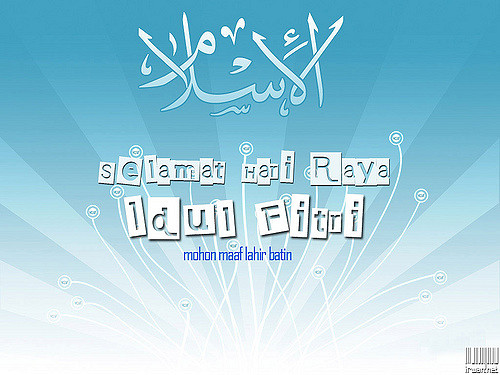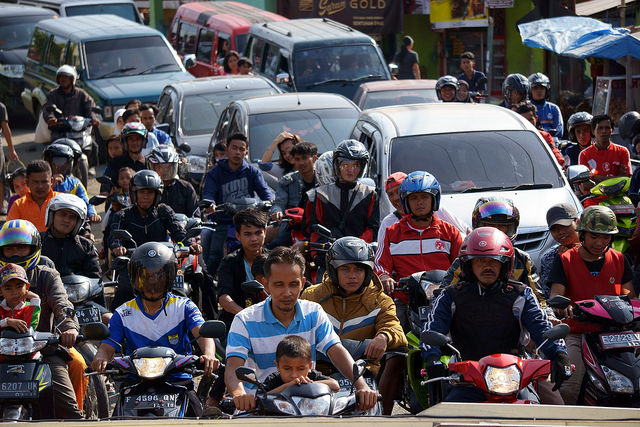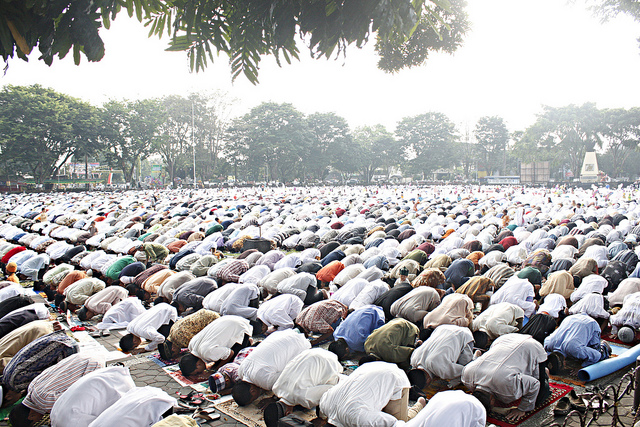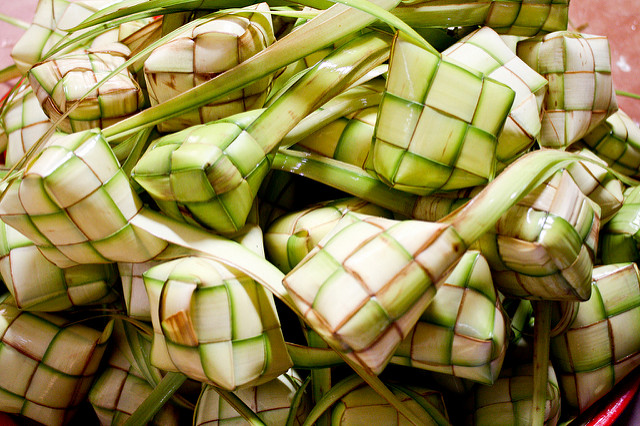Lebaran – The End of Ramadan Posted by sasha on Jul 6, 2016 in Uncategorized
Today is an important holiday in Indonesia and all across the Muslim world. Eid al-Fitr (“festival of breaking the fast”) marks the end of the holy month of Ramadan, during which people fast from sun up to sun down. In Indonesia, it’s known as Hari Raya Idul Fitri, or more commonly Lebaran. While Idul Fitri is simply the Indonesian spelling of the Arabic name for the holiday, it’s not clear where the name Lebaran comes from. Let’s learn a bit more about this holiday, as well as some useful Indonesian vocabulary related to it:
Date and Length

Photo by Irwan H Nuswanto from flickr.com.
As the date of the festival depends on the sighting of the new moon, it varies from year to year. Although the official holiday is two days long, the government usually adds a few extra days. This year, Lebaran falls on July 6th, but many people are enjoying the entire week off of work. In Indonesian, these extra days off are known as Cuti Bersama (joint holiday). The idea behind the added days off is to stimulate tourism within the country, and also to improve the efficiency of public servants.
Customs
An important custom associated with Lebaran is visiting family and friends to ask for forgiveness for any past wrongdoings. This is expressed in the phrase, “Mohon Maaf Lahir Batin,” which can be translated as “please forgive me for anything wrong I have done in the past.” In order to do this, millions of workers in the big cities of Indonesia need to return to their hometowns and villages. This mass migration is known as pulang kampung, or mudik. Even though additional transportation is added to handle the millions of people, the roads are still jammed, buses and trains are overcrowded, and it’s basically general chaos on the roads everywhere. People are willing to endure these hardships to visit their loved ones and participate in this vital tradition.
On the night before Lebaran, there’s a prayer celebration known as takbiran. The takbir is the term for the Arabic chant Allāhu Akbar (“God is great”), and it can be heard throughout the evening in mosques all over the country. Even in the streets, you’ll hear people chanting, singing, dancing, and banging drums. In many rural parts of Indonesia, people will light obor (torches) and damar/pelita (oil lamps) and place them outside or around their homes. It’s a very festive atmosphere that often contains fireworks, although authorities have been trying to discourage them in recent years.
After the morning prayers on the day of Lebaran, the visits to family and friends begin. It’s customary to have drinks and snacks at every house, so by the end of the day people are quite full – a welcome feeling after a month of fasting every day. During these visits, it’s also customary for older family members to give some uang lebaran (Lebaran money) to children, usually small amounts in colorful envelopes.
There are plenty of other gifts handed out around Lebaran. Bingkisan Lebaran are elaborately wrapped gift boxes that are given in the week prior to the holiday. They usually contain food and small household appliances. Follow this video for some great Indonesian practice and to learn how to make your own:
Many people will also send out Kartu Lebaran (greeting cards) to their Muslim friends in preparation for the holiday. In Indonesia, Lebaran also has a legally mandated bonus for all employees, known as Tunjangan Hari Raya (THR for short). The amount differs according to the region, and can be up to an entire month’s salary in places like Jakarta. It’s also during this time that the Zakat (poor tax) is handed out. Generally, this should be about 2.5% of one’s income, and is paid to charitable organizations, neighborhood groups, or directly to the poor and needy.
Shopping and eating are both huge aspects of Lebaran. People in Indonesia like to wear new clothes and shoes for Lebaran, so shops and malls across the country are packed in the lead-up to the holiday. Many stores will offer special Lebaran discounts, put up festive decorations, and play special music, much in the same way Christmas is welcomed in other countries. To celebrate Lebaran, families will get together for a large feast. One traditional dish found on many tables is ketupat, a rice cake cooked inside a pouch made of woven palm leaves. Other common dishes are opor ayam, rendang, and sambal goreng ati, as well as a wide variety of snacks.
For more on this holiday, and for a great challenge of your Indonesian listening skills, check out this news clip:
As you can see, Lebaran is a very important and festive holiday in Indonesia. To all of our readers, and to all of the people in Indonesia celebrating today, we say:
Selamat Idul Fitri!

Build vocabulary, practice pronunciation, and more with Transparent Language Online. Available anytime, anywhere, on any device.
About the Author: sasha
Sasha is an English teacher, writer, photographer, and videographer from the great state of Michigan. Upon graduating from Michigan State University, he moved to China and spent 5+ years living, working, studying, and traveling there. He also studied Indonesian Language & Culture in Bali for a year. He and his wife run the travel blog Grateful Gypsies, and they're currently trying the digital nomad lifestyle across Latin America.






